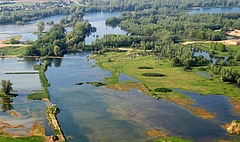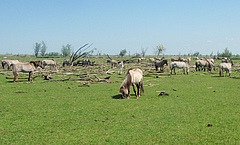16.10.2018 | TOP NEWS, Biodiversity Conservation, sDiv
Helping nature find its own way

The Millingerwaard area in the Netherlands is well on its way to a wilder future (Photo: Ark Nature/Rewilding Europe).

When there are no wolves and no hunting, wild herbivores will eat all vegetation, leaving nothing for insects. This has happened in the Oostvaardersplassen nature reserve in the Netherlands 2013. (Photo: Roel van Klink, 2013).
Note for the media: Use of the pictures provided by iDiv is permitted for reports related to this media release only, and under the condition that credit is given to the picture originator.
Two new iDiv publications take a closer look at rewilding.
Leipzig. Rewilding is a growing restoration and conservation movement aimed at restoring natural landscapes and reintroducing lost species. The journal Philosophical Transactions B has dedicated a special issue to rewilding, which includes two publications by iDiv-affiliated researchers. The first one provides a set of indicators to measure the progress of rewilding, and the second one assesses how rewilding can promote insect conservation. Rewilding is a new way of nature conservation that advocates for as little human interference in natural ecological processes as possible. Sometimes an initial stage of active restoration is necessary, but after that, the basic idea of rewilding is that humans step aside and let nature manage itself. Typical rewilding measures are, for example, removing dams to allow rivers to run freely, reintroducing lost species or stopping active management of wildlife populations. The goal is to restore ecological integrity, i.e., nature and all of its components. A rewilding assessment framework As the practice of rewilding takes off, it is important that the science underpinning it keeps up. This need receives a welcome boost today with the publication of a special rewilding issue of Philosophical Transactions B, an eminent scientific journal published by the UK’s Royal Society. Dr Aurora Torres from the German Centre of integrative Biodiversity Research (iDiv) and the Martin Luther University Halle-Wittenberg is the lead author of one of the articles. She explains: “Rewilding is not simply the protection of wilderness areas, but an approach to restoring the healthy ecological complexity of natural environments damaged by human activity. Its principles can be applied to a wide variety of landscapes – from highly urbanized sites to remote mountainous areas – with different degrees of ecological degradation. But, until now, a suitable framework to quantify progress in achieving rewilding goals has been missing”. Therefore, in their article ‘Measuring Rewilding Progress’, Torres and her colleagues present a benchmark framework for assessing progress and success of rewilding initiatives. The researchers designed a set of indicators for measuring ecosystem changes brought on by implementing rewilding actions over time, such as reducing farming, forestry and artificial feeding of wildlife, restricting hunting and fishing, removing dams, or leaving deadwood in forests. This effort was complemented by interviewing practitioners and by an extensive review of the effectiveness of commonly used restoration actions for rewilding goals. To test the new framework, the researchers applied it to three flagship restoration areas with vastly different ecologies: the inland wetlands of Iberá in Argentina, the Swiss National Park in the Western Rhaetian Alps, and the Millingerwaard rewilding site in the Netherlands. At Millingerwaard, a “helping hand” from the area managers has brought the wetland back from the brink. Riverine vegetation has recovered, populations of wild boar, otter and white-tailed eagle have bounced back and the reintroduced beavers now have a thriving community of more than ten families. The new framework developed by Torres and her colleagues will help scientists and on-site managers to assess rewilding progress in areas like Millingerwaard in the future. Insects in rewilding areas A second paper in the special issue was published by iDiv researcher Dr Roel van Klink together with a colleague from the Dutch Butterfly Conservation in the Netherlands. The researchers collected publications about how insects and other invertebrates respond to rewilding in ten nature reserves in Europe. At one of those reserves, Oostvaardersplassen in the Netherlands, the study authors had conducted field experiments earlier. At Oostvaardersplassen, Konik horses (a robust breed that resembles the ancient wild horse), as well as Heck cattle (another robust breed) and red deer were introduced. Through grazing, these herbivores should prevent that the whole reserve would become a forest. This worked a bit too well, though: today there are no areas anymore that are not completely grazed down. When the researchers put up fenced areas, they found that this added many insect species to the biodiversity of the reserve. “What we conclude from our own and the other field studies we reviewed is that insects can benefit from rewilding, but only when all natural components are in place,” van Klink says. “When large carnivores that eat herbivores are missing, there will be too many herbivores, which will eat all the plants, leaving no place to live for insects and other small animals. “ If it is impossible to restore all the natural processes, and especially, feeding networks, the researchers recommend that it is best to install a substitute. A possible substitute could be periodic translocation of herbivores, meaning that animals are taken out of the reserve and brought to other reserves. This can help to keep their population densities low. Promoting rewilding principles The Royal Society’s high profile recognition of rewilding science comes at a particularly timely moment. Right now, the leading environmental NGOs BirdLife Europe, WWF Europe and the European Environmental Bureau in partnership with Rewilding Europe and iDiv, are pushing to ensure that rewilding principles feature strongly in the EU’s post-2020 Biodiversity Strategy. The goal is to strengthen the EU restoration agenda and ensure the creation of a coherent ecological network in Europe by promoting rewilding principles. Dr Aurora Torres, Dr Néstor Fernández and Prof Henrique Pereira from the iDiv research centre and the Martin Luther University Halle-Wittenberg lead the research activities within the initiative. This text is partly based on a longer article on rewilding by BirdLife Europe.Original publications (iDiv-affiliated researchers in bold):Aurora Torres, Néstor Fernández, Sophus zu Ermgassen, Wouter Helmer, Eloy Revilla, Deli Saavedra, Andrea Perino, Anne Mimet, José M. Rey-Benayas, Nuria Selva, Frans Schepers, Jens-Christian Svenning, Henrique M. Pereira (published on October 22, 2018): Measuring rewilding progress. Philosophical Transactions of the Royal Society B. DOI: 10.1098/rstb.2017.0433. Roel van Klink and Michiel F. WallisDeVries (published on October 22, 2018): Risks and opportunities of trophic rewilding for arthropod communities. Philosophical Transactions of the Royal Society B. DOI: 10.1098/rstb.2017.0441. Both publications appeared in the special issue of Philosophical Transactions of the Royal Society B entitled “Trophic rewilding: consequences for ecosystems under global change”. DOI: 10.1098/rstb/373/1762.Related news: Rewilding as a means to reinforce Europe's ecological restoration (29.09.2017): https://www.idiv.de/news/archive_2017/news_2017_single_view/news_article/rewilding_as.html Green shoots for rewilding (05.04.2017): https://www.idiv.de/news/news_single_view/news_article/green-shoots.htmlContact: Dr Aurora TorresResearch group Biodiversity Conservation
German Centre for integrative Biodiversity Research (iDiv)
Martin Luther University Halle-Wittenberg
Mail: aurora.torres@idiv.de
Web: https://www.idiv.de/groups_and_people/employees/details/eshow/torres_aurora.htmlDr Roel van Klink
Synthesis Centre sDiv
German Centre for integrative Biodiversity Research (iDiv)
Mail: Roel.klink@idiv.de
Web: www.idiv.de/groups_and_people/employees/details/eshow/van_klink_roel.htmlDr Néstor Fernández
Research group Biodiversity Conservation
German Centre for integrative Biodiversity Research (iDiv)
Martin Luther University Halle-Wittenberg
Mail: nestor.fernandez@idiv.de
Web: www.idiv.de/groups_and_people/employees/details/eshow/fernandez_nestor.htmlDr Tabea Turrini
iDiv Media and Communications
Mail: tabea.turrini@idiv.de
Web: https://www.idiv.de/de/gruppen_und_personen/mitarbeiterinnen/mitarbeiterdetails/eshow/turrini_tabea.html
